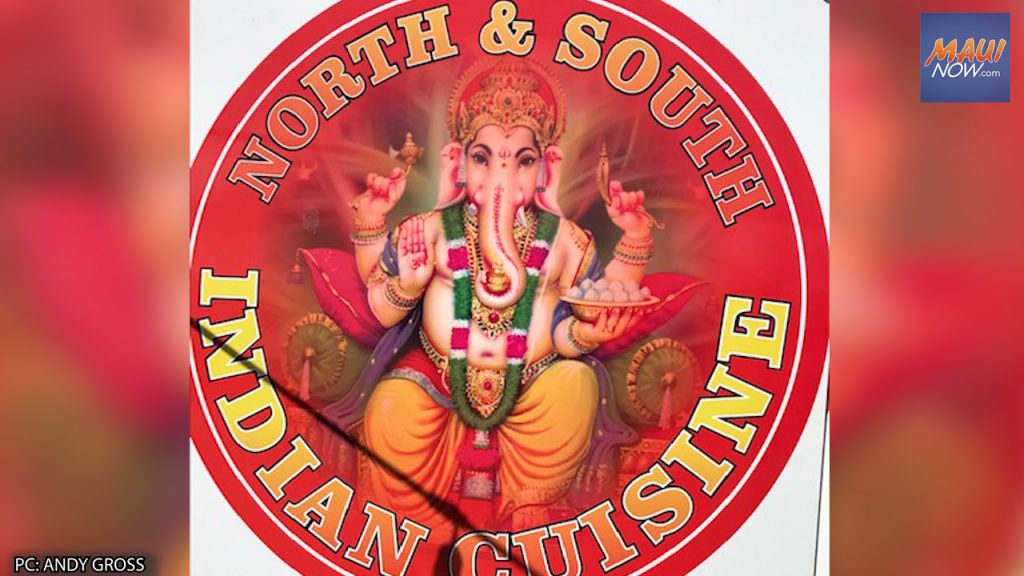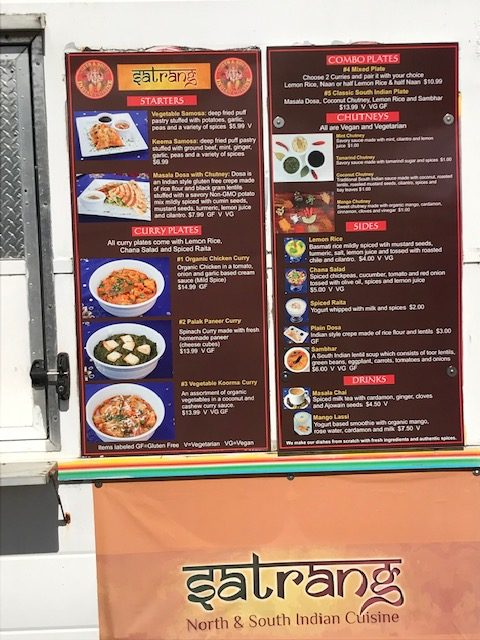Satrang Indian Cuisine in Haʻikū Offers Glimpse Into Maui’s Food Truck Scene

Long before they decided to open their popular food truck in Haʻikū Marketplace, Harpreet and her husband Jason Murthi would play a little food game. “I love to cook and I would ask, ‘hey, would you pay for this,’” she said referring to recipes she would experiment with.
Years later, the answer from both locals and visitors is a resounding “yes.”
The couple has been operating Satrang, the only Indian cuisine food truck on Maui for the past six years.
The truck is colorfully painted and offers both northern and southern Indian cuisine.
Harpreet said Satrang is a Punjabi word that translates into “seven colors. ‘Sat’ meaning seven and ‘rang’ being colors. Being on Maui with an abundance of rainbows showcasing seven colors we decided to tap into the brilliance of (the) rainbow Mana.”

They arrived on Maui in March of 2012. Both had food and hospitality backgrounds but the food truck was still an idea whose time had not yet arrived. That would take a combination of kismet, mentoring, luck and initiative.
Harpreet’s parents owned an Indian restaurant in California. “My mom was a real foodie,” she said.
Meantime in the middle of the country, Jason was earning his entrepreneurial bona fides working at a gym in Michigan preparing smoothies and bagels, practically managing the place. By the way, he was between the ages of 12 and 15 at the time and an avid gym goer.
Jason and Harpreet would make the rounds on Maui selling at farmers’ markets and doing some catering.
They were also selling Indian food a few days a week at the counter of an adjacent taco truck.
As fate would have it, a Thai food truck next door decided to leave. Sam Ballout, a neighbor at Haʻikū Marketplace, was in the process of buying two food trucks from the mainland. The couple was asked if they would like to lease one truck and make it their own and again the answer was another resounding “yes.”
“It was like the coconut wireless and word of mouth took over,” she recalled as they got their start. “We didn’t know we would have a truck. We knew people wanted Indian food, everyone would ask us.”
Ballout owns and operates the popular Middle Eastern food truck next door.
As Jason noted the only thing to expect as the operator of a new food truck business is the unexpected.
As Ballout, who became a mentor to them, explained in what they would eventually view as a business mantra, “the business will teach you.”
Some of the lessons have been difficult.
Her: “It’s a day by day learning process. Everything is a lesson.”
Him: “ There is no control with a food truck.”

Which means they cannot predict how many customers will show on any one day, what the Haʻikū weather might bring and other factors, such as power outages. Or COVID-19 which has driven up prices and resulted in creation shortages including spices and even Basmati rice.
But remember, the business will teach you.
“The night before we opened we were expecting a big opening so we were up all night cooking,” he said.
“We cooked as if we had a catering order,” Harpreet recalled.
As per County regulations, the food is prepared in a commissary kitchen in Wailuku. There is about three to three and half hours of prep work and the food is put in pans and then transported to the truck.
The menu is consistent with three curry plates, one meat and two vegetarian, combo plates and an assortment of side dishes. There are also traditional and hard to come by favorites like Masala Dosas, a classic southern Indian dish.
Some of the dishes are organic and all are labeled for dietary restrictions such as gluten-free and vegetarian.
Satrang has a loyal and large following on social media with many rave reviews.
The truck is closed on Thursdays and Fridays.
The actual food truck was outfitted for coffee and has two burners which can make getting the food out stressful.
“Space is an issue, and we are not fast food. We are more gourmet,” Harpreet said, “it takes time to cook but it’s worth the wait.”
Also, when they sell out of something, that’s it, it’s gone.
The duo, who have been together about 15 years, admitted there can be tense moments in the kitchen with food orders pending and other pressures.
“It can be hard to turn work off, but we enjoy each other’s company,” she said, while Jason added they can always hug out a tense moment.
Over the past decade there has been a proliferation of food trucks all over the island.
If you park it, they will come, and they will eat.
The county does not have a precise number on exactly how many trucks there are.
The Haʻikū parking lot location is more open and varied compared to other venues. There is a lot of foot traffic as well as a steady stream of people waiting for buses, disembarking from bike tours and existing businesses in the cannery looking for lunch options.
Jason said he is quite satisfied with the location of the business. The couple live just up the road which is convenient if they forget something.
“We’ve been lucky here. A lot of people want to support local business and we have a lot of loyal Indian tourists who come from the other side of the island.”
Tejas Agarwal is among them. The visitor from northern New Jersey said, “I’m a vegetarian. We came from a sunrise (bike) tour and saw the food truck. It’s a place we want to go.”
Kimberly Klewe, another diner, also praised the cuisine. “I just like Indian food for its rich flavors. It’s unique and comforting and filling. I like to support local businesses.”
According to the website bizfluent, there are hurdles to clear before opening a food truck.
Hawaiʻi has a number of restrictions and permits for mobile food businesses. If you prepare food elsewhere for sale from the truck, the food must be stored and cooked in a facility approved by the health department for the city or county where it is prepared. You will need to get a food services permit, pass a safety inspection of your vehicle, and take a food safety course at one of two offices on the Big Island.
Then, one files for a business license at city or county offices, gets a tax identification number from the federal government and secures a license to collect Hawaiʻi’s general sales tax from the state. Depending on the location, you might need to apply for city or county permits and environmental and/or health departments for each location where one plans to sell food.
Back in the day, Jason and Harpreet flirted with the notion of opening a Thai-Indian restaurant in Haʻikū. But in the true spirit of the business will teach you, the overwhelming cost and likely creative differences ended that idea early.
Jason still has his entrepreneurial streak marketing their Chutney Swamy Food sauces to purveyors like Mana and Down To Earth among others.
In a perfect world, if they were to open a second truck they said the most likely locations would be Kīhei or Kāʻanapali.
Much of Jason’s family has relocated to Kīhei while Harpreet’s parents remain in the Sacramento area.
But for now, the couple is content with their Haʻikū home. And philosophical and cautious too, even given their success.
“We are still in the land of the unknown,” Jason said reflectively, the business still teaching them even as they go and grow.








